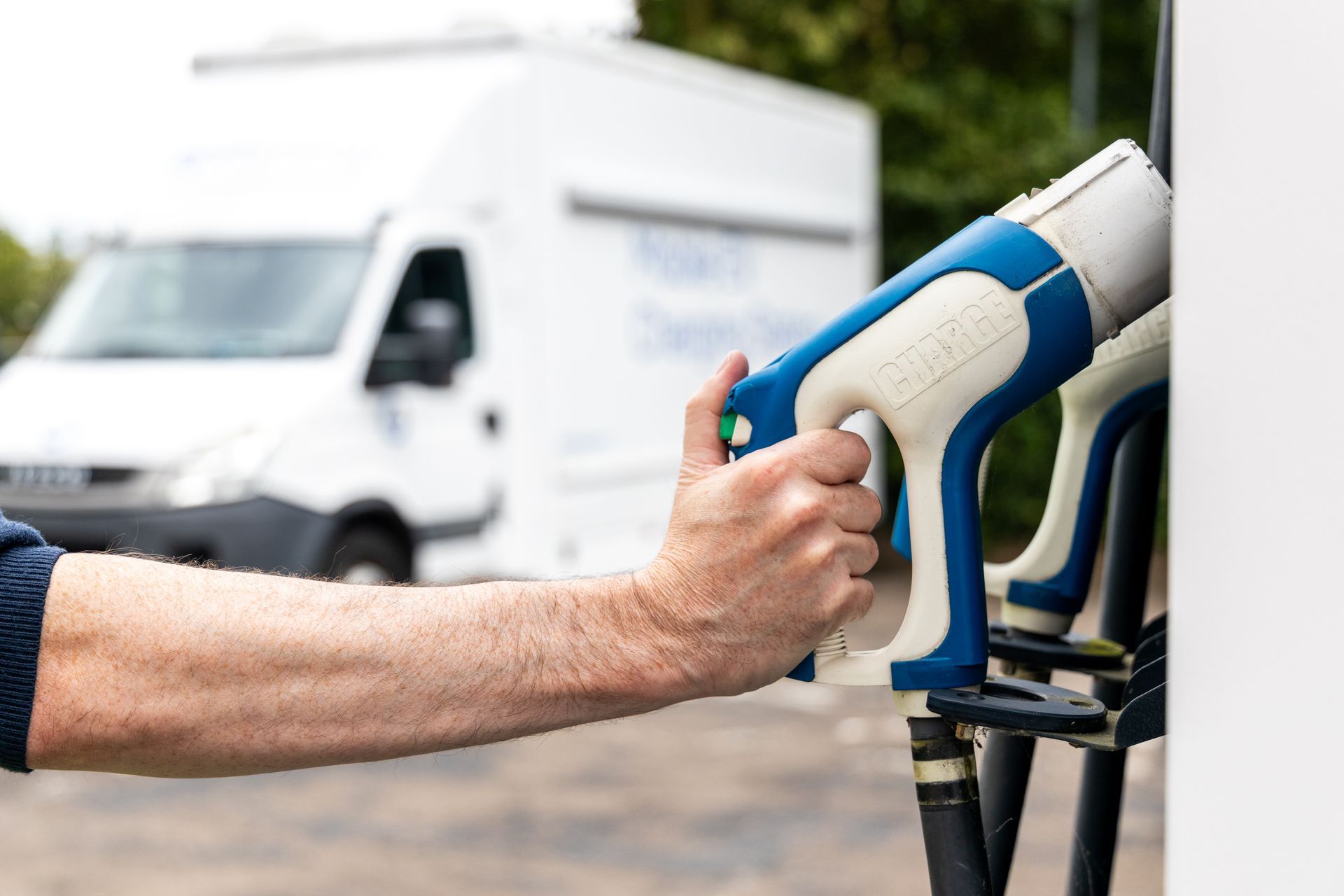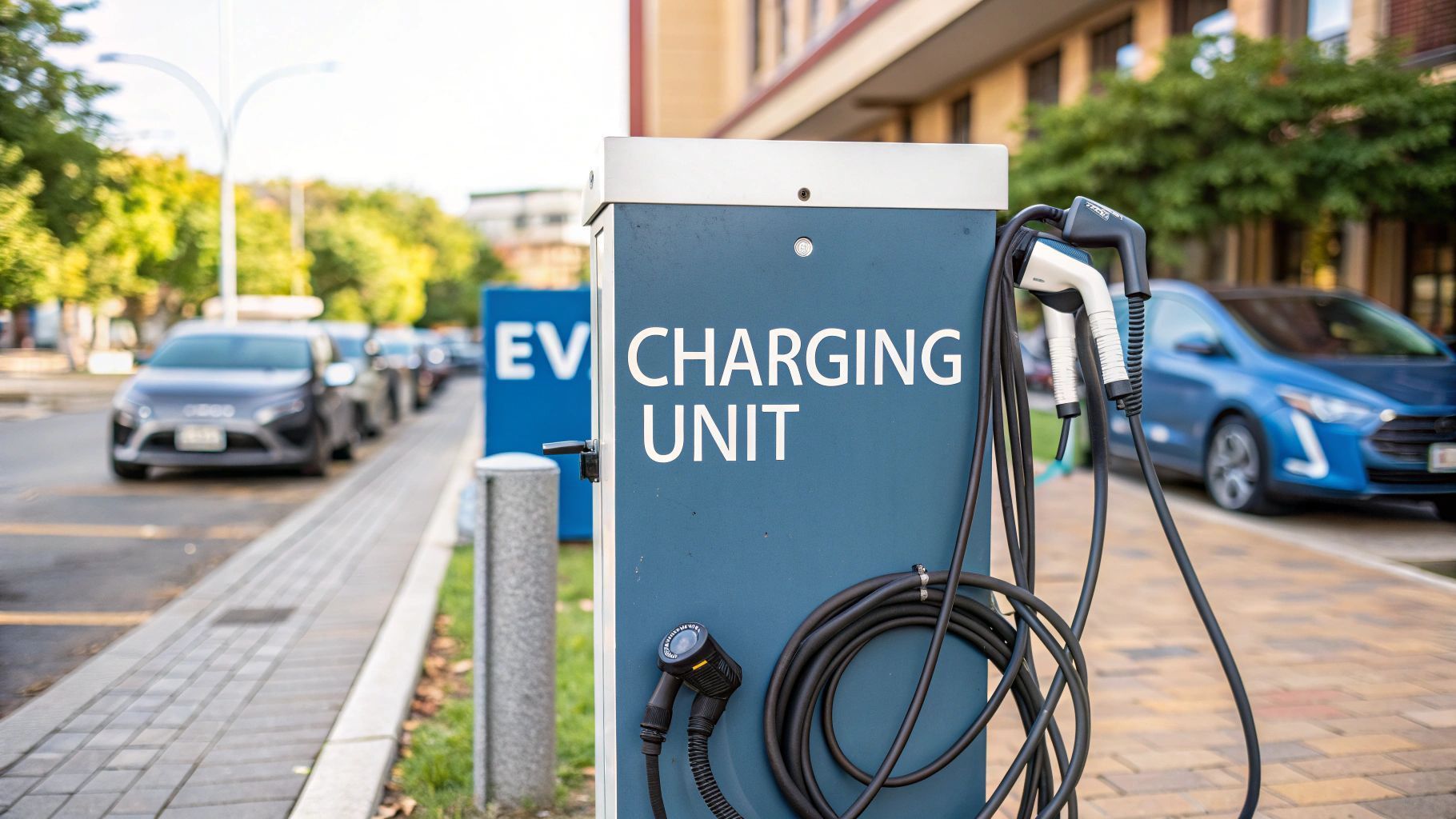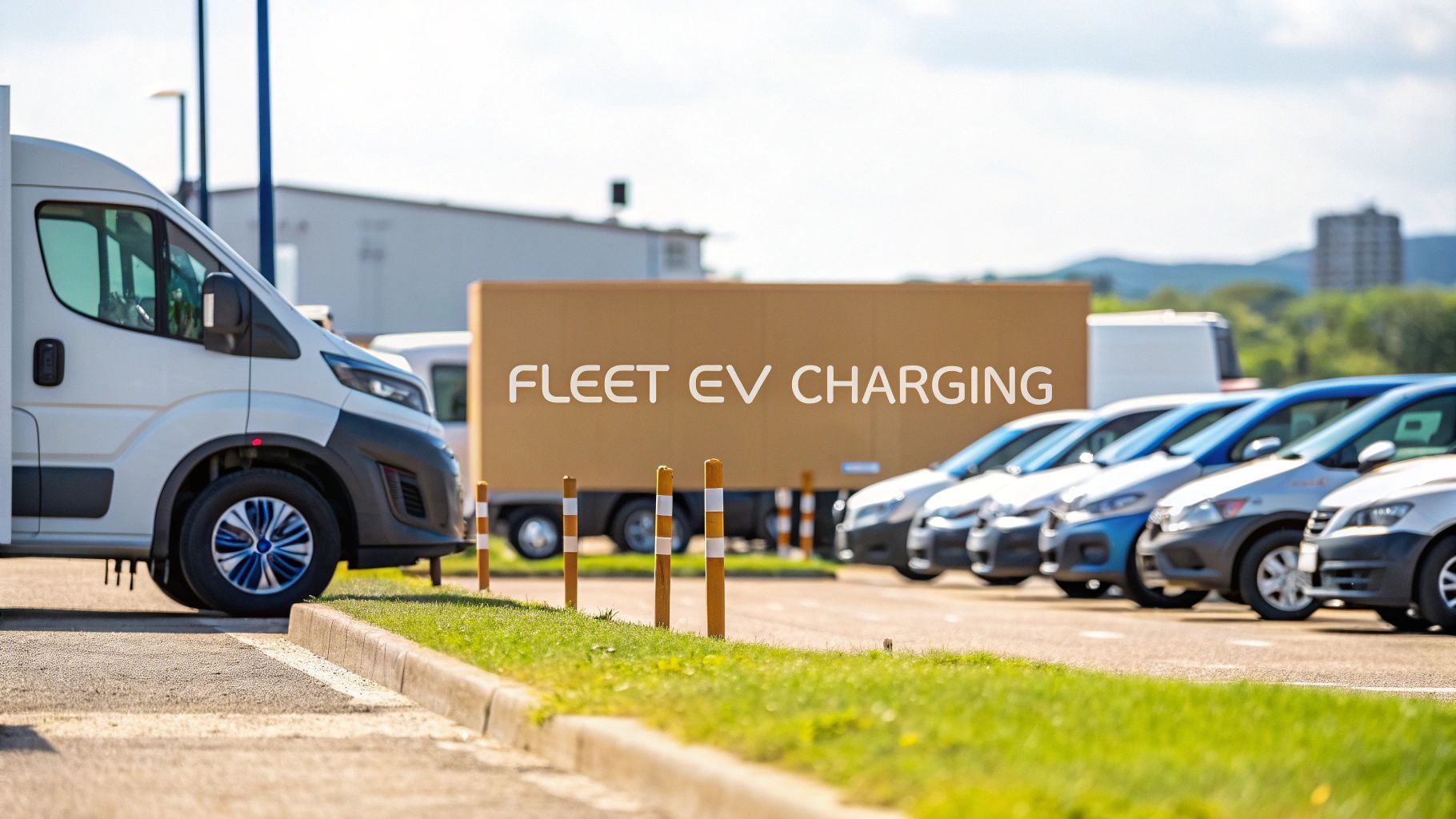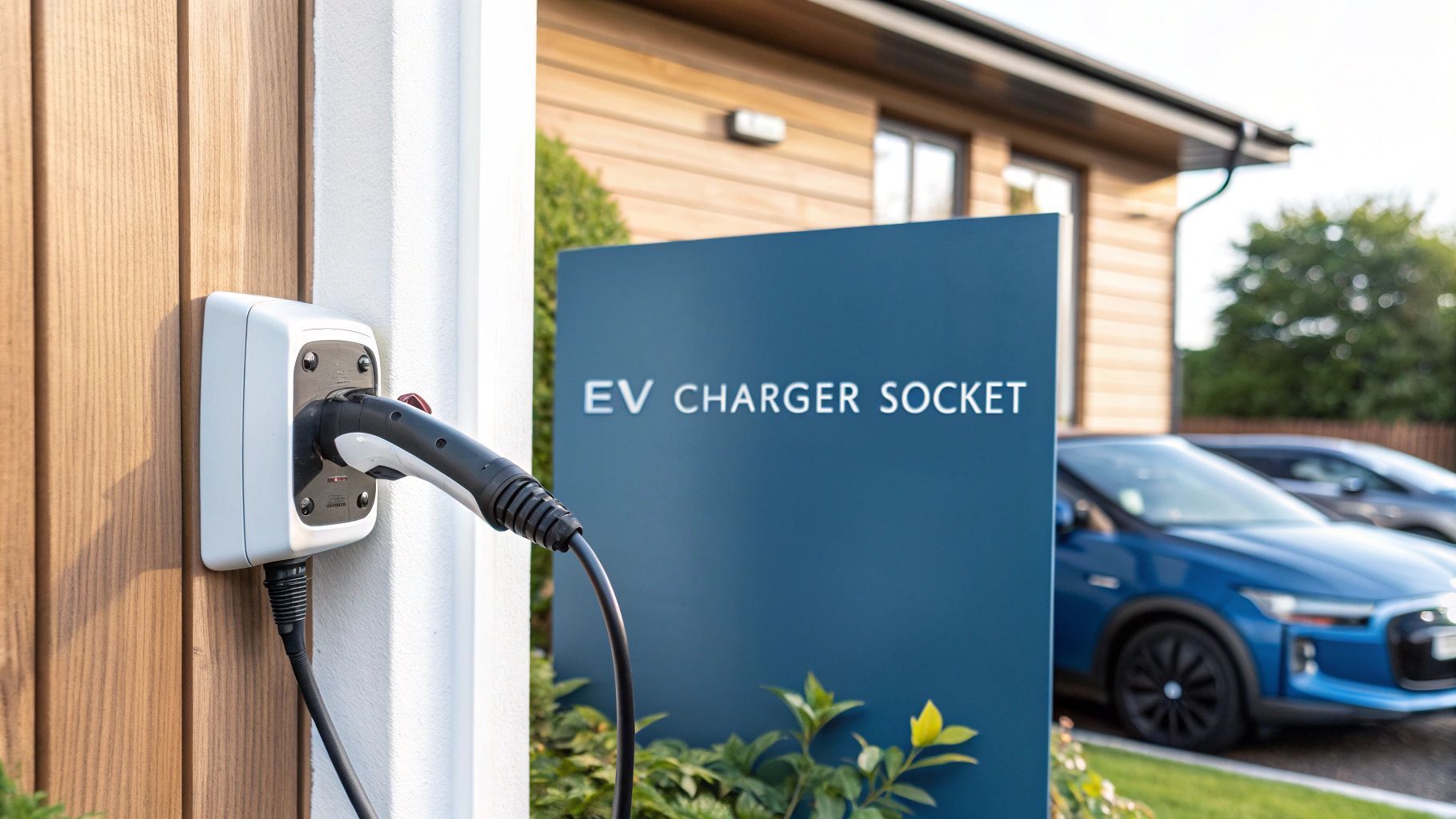What Does kWh Mean in the UK?
Ever glanced at your electricity bill and felt a bit lost staring at the term kWh ? It is a common experience. In simple terms, a kilowatt-hour (kWh) is a unit of energy , not power. It is the standard measurement your supplier uses to track how much electricity you have used over time and it is the number that ultimately determines your bill.
Demystifying The Kilowatt-Hour
The best way to think of a kilowatt-hour (kWh) is not as a measure of electrical speed but as a straightforward package of energy. Imagine you are buying a single ‘block’ of power that gets delivered over an hour.
Let us take a simple one-bar electric heater. These typically use around 1,000 watts . If you run that heater for exactly one hour, you have used precisely one kWh of energy. It is as simple as that.
This single unit is the foundation for understanding everything from your household energy habits to the real-world cost of charging an electric vehicle. Getting your head around this concept is the first real step towards taking control of your energy consumption and, more importantly, your spending.

Kilowatt-Hour at a Glance
To make it even clearer, let us break down the components. Understanding the difference between power (kW) and energy (kWh) is the key to making sense of how you are billed.
Here is a quick breakdown of what each term means.
| Component | What It Means | In Simple Terms |
|---|---|---|
| Watt (W) | A measure of power. | The rate at which energy is used, like speed. |
| Kilowatt (kW) | 1,000 watts . | A larger unit of power, used for bigger appliances. |
| Kilowatt-hour (kWh) | 1,000 watts used for one hour. | The total amount of energy consumed, like distance. |
At the end of the day, the kWh is what truly matters on your bill. It represents the total volume of energy you have used, not just how quickly you used it. If you want to dive deeper into the numbers, you can explore our guide on how to calculate a kilowatt-hour for your own appliances.
How Everyday Life Uses kWh
So, what does a kilowatt-hour actually look like in the real world? On your energy bill, it is just another number but in your home, it is the fuel for your daily routines. Getting a feel for this connection is the key to understanding where your money is going.
Think of a single kilowatt-hour as a tangible block of energy you can spend. For instance, one kWh is roughly what you would need to:
- Power a modern LED television for about 10 hours
- Run a full washing machine cycle
- Keep a laptop charged for an entire working day
Every time you boil the kettle or leave a light on, you are using up these little blocks of energy.

Making Each Kilowatt-Hour Count
Once you start seeing energy this way, the value of efficiency becomes obvious. Upgrading to energy-efficient appliances means you can get more done with each kilowatt-hour you buy, effectively stretching your money further. It is not about doing less; it is about being smarter with your consumption.
An older appliance, for example, can be a real energy hog. A modern, A-rated fridge-freezer might use half the kWh of a model from ten years ago for the exact same job, leading to some serious savings over its lifetime.
The core idea is simple: the more efficient your home is, the more value you get from every single kWh on your bill. This mindset shift helps you take control of your energy costs.
Over the past two decades, UK households have become much more energy efficient. The average annual electricity use has dropped from 4,662 kWh to 3,449 kWh . This is largely thanks to the widespread switch to LEDs and better-performing appliances.
However, the recent rise of electric vehicles and data centres has nudged UK electricity consumption up for the first time in 19 years. This makes the kWh an even more crucial metric for tracking both our efficiency gains and the new demands on our grid. You can read more about UK electricity consumption trends at Heatable.co.uk.
kWh as the Fuel for Electric Vehicles
If you are an electric vehicle (EV) owner, the kilowatt-hour is your new litre of petrol. It is the single most important unit you will need to get your head around to understand your car's performance, range and running costs.
Think of an EV's battery as its fuel tank. The size of that tank is measured in kWh and its efficiency is rated in miles per kWh. A bigger battery, like the 77 kWh unit in a Volkswagen ID.4, holds more energy and can take you further, just like a larger petrol tank but what really matters is how efficiently your car uses that energy.

Home vs Public Charging Costs
Where and when you plug in makes a huge difference to your wallet. The price you pay per kWh can vary dramatically depending on the charger you use.
- Home Charging: Plugging in overnight at home is almost always the cheapest way to go. You can tap into off-peak electricity tariffs where a kWh costs far less than the standard rate, making it perfect for your daily commute.
- Public Charging: Using a public rapid charger gets you back on the road quickly but you pay a premium for that speed and convenience. The price per kWh is naturally higher.
- Mobile Charging: The ultimate convenience is having a charge delivered to you. This service allows drivers to avoid queues and get a top-up wherever they are parked, offering a valuable time-saving solution that traditional charging cannot match.
Getting to grips with this is fundamental for managing your EV expenses. Of course, the exact cost varies between different car models and charging networks but the basic idea is the same. If you are curious about the specifics, you can dive into the true price to charge a Tesla in the UK in our detailed guide.
A firm grasp of what kWh means empowers you to plan your journeys with confidence. It transforms the abstract number on a charger into a tangible measure of distance and cost, putting you in control of your EV running costs. This knowledge is what makes driving an electric vehicle both practical and economical.
The Business of Selling kWh on the Go
Beyond your personal energy bills and the running costs of your EV, the kilowatt-hour holds a fascinating commercial opportunity. In the booming electric vehicle market, the kWh is no longer just a cost—it is a valuable commodity, especially for mobile EV charging operators.
The business model is refreshingly simple. An operator buys electricity, measured in kWh, at a low price. This could be from the grid during cheaper off-peak hours or even generated directly from solar panels. They then sell those kilowatt-hours at a premium to EV drivers who need a convenient charge away from home. The advantage of mobile charging is its unparalleled flexibility; power can be delivered to workplaces, retail parks, or roadside locations, meeting demand exactly where it arises.
Turning Kilowatt-Hours into Profit
The profit is all in the margin—the difference between the buying and selling price of each kilowatt-hour. For instance, an operator might buy electricity for 15p per kWh overnight. They can then turn around and sell that same kWh for 50p or more during the day to a driver needing a top-up. A driver will happily pay this premium for the sheer convenience of having a charge delivered directly to their vehicle, saving them the time and hassle of finding and waiting at a fixed charging station.
This price gap creates a direct return on investment. The real key is providing power exactly where and when it's most needed, turning convenience into a saleable product. Every single kWh stored in a mobile charging unit is potential income just waiting to be unlocked.
A mobile charging business thrives by treating the kWh as its core product. The operator’s success is measured by their ability to acquire energy cheaply and sell it efficiently, making every single kilowatt-hour count towards their bottom line.
To put this into perspective, let's look at a quick breakdown of how selling kilowatt-hours can translate into real earnings for a mobile charging operator.
Potential Earnings from a Mobile EV Charging Unit
| Metric | Example Value | Explanation |
|---|---|---|
| Energy Purchase Cost | 15p per kWh | The price paid to acquire electricity during off-peak hours. |
| Sale Price to Customer | 50p per kWh | The price the EV driver pays for a convenient mobile charge. |
| Gross Profit per kWh | 35p | The direct profit made on every kilowatt-hour sold. |
| Daily kWh Sold | 200 kWh | A conservative estimate for a unit operating in a busy area. |
| Daily Gross Profit | £70 | The total profit before accounting for operational costs. |
This simple illustration shows how the numbers quickly add up. An operator running a fleet of just five mobile units could potentially generate over £10,000 in gross profit per month , showcasing the significant financial opportunity in this growing market. By focusing on maximising the profit from each kWh, operators can build a strong, scalable business.
Maximising Your Earnings Per kWh
Several factors influence how much an operator can charge per kWh and therefore, how much profit they can make. Location is everything; a charger in a high-demand area with little competition, like a busy event or a business park without its own fixed chargers, can command a much higher price.
Demand also plays a huge role. During peak times or in emergencies, the value of an immediate mobile charge shoots up. Smart operators can adjust their pricing dynamically to reflect this, getting the most out of their available kWh supply. To get a better feel for the financial returns, you can explore detailed breakdowns of the economics of mobile EV charging in our deep dive.
By truly understanding what kWh mean from a commercial perspective, entrepreneurs can tap into a vital and expanding market right across Britain.
Where Your kWh Comes From in the UK
Not all kilowatt-hours are created equal. Far from it. The real environmental cost of a single kWh hinges entirely on how it was generated and here in the UK, that energy mix is in a constant state of flux. Understanding this journey from power station to plug socket is the key to making smarter choices about when you use electricity.
The sources feeding our national grid have shifted dramatically. In a recent snapshot, natural gas was the largest single contributor at 38% of our electricity, with wind power close behind at 27% . Nuclear and imported energy each supplied around 12% . Coal, once the backbone of British power, has almost vanished from the picture, dropping from just 2% the year before to a staggering 0% . If you are curious, you can dig into the latest analysis of Britain's electricity from EdenSeven.
Carbon Intensity: What It Means for You
This ever-changing energy mix has a direct effect on something called carbon intensity . It is a simple but powerful measure: how many grams of CO₂ are released for every single kWh of electricity produced.
Think about it this way. When the wind is howling and the sun is blazing, the grid is flooded with clean energy and the carbon intensity plummets but on a still, grey day, we have to lean more heavily on gas power stations, which causes the carbon intensity to climb.
Recently, the average sat at 168 gCO₂/kWh . However, the rolling 12-month average was significantly lower at 125 gCO₂/kWh , which shows we are making real, tangible progress on the road to decarbonisation.

As this chart shows, there is a clear commercial flow in the EV charging world. An operator can purchase energy at a low wholesale cost and then sell it on at a premium, generating a profit from each kilowatt-hour delivered to a driver.
When you know the story behind your energy, it changes how you see it. It empowers you to be more thoughtful about your consumption, aligning your daily habits with our national climate goals and helping to build a greener grid for everyone.
Common Questions About kWh Answered
To really get your head around kWh, it helps to tackle the questions that pop up most often. Let's run through them with some quick, clear answers to lock in what we have discussed so you can use this knowledge with confidence.
What Is the Difference Between kW and kWh Again?
This is easily the most common point of confusion but the distinction is actually quite simple. Think of it like speed versus distance.
- Kilowatt (kW) is all about power . It is the rate at which an appliance is using energy right now, just like your car's speed in miles per hour.
- Kilowatt-hour (kWh) is all about energy . It is the total amount of electricity you have used over a period, like the total distance you have driven on a journey.
Your electricity bill is based on the total kWh you use, not just the peak power (kW) you happen to draw at any single moment.
How Can I Calculate kWh for My Own Appliances?
Working out how much energy an appliance is guzzling is surprisingly straightforward. You just need to know its power rating in watts (usually on a sticker somewhere on the device) and roughly how long you use it for.
Here is the simple formula:
(Appliance Wattage ÷ 1,000) × Hours of Use = kWh Consumed
For example, let's say you use a 2,000-watt kettle for a total of 15 minutes ( 0.25 hours) in a day. The maths is just (2000 ÷ 1000) × 0.25 = 0.5 kWh . This little formula is a brilliant way to see exactly where your energy is going.
How Much Does One kWh Cost in the UK?
The price you pay for one kilowatt-hour can vary quite a bit. It depends on your supplier, your tariff and sometimes even the time of day. As a rough guide, the average standard variable tariff rate is currently floating around 25p per kWh .
But here is where it gets interesting. EV drivers on special off-peak tariffs might pay as little as 7.5p per kWh for overnight charging. This really shows why understanding the cost per kWh is so crucial for managing your bills, especially with something power-hungry like an electric car.
Ready to turn your understanding of the kWh into a profitable business venture? ZAPME offers pioneering mobile EV charging solutions that allow you to buy energy low and sell it at a premium. Discover how you can become a part of the UK's EV charging revolution by visiting https://www.zapme.biz.











